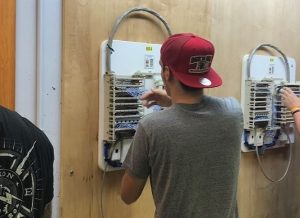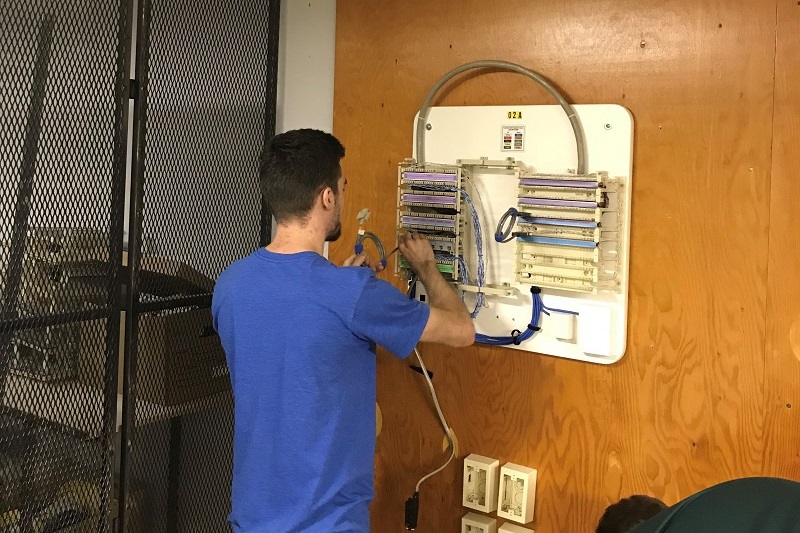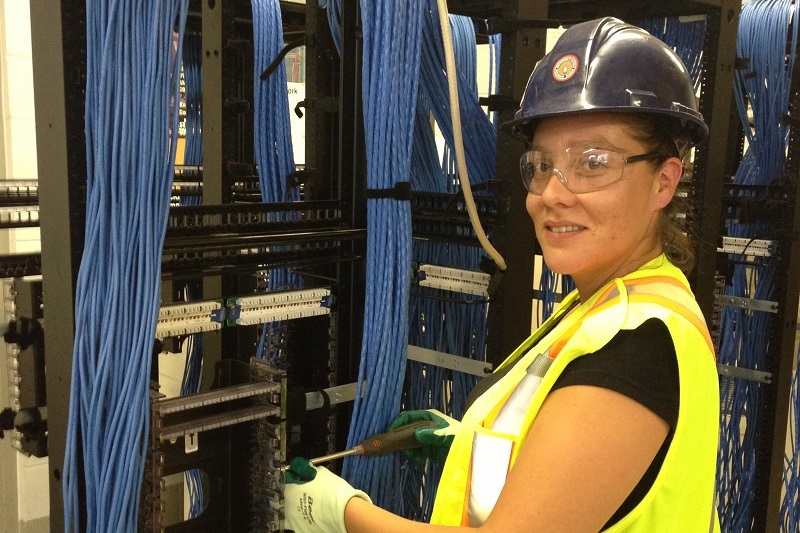Results You Can Count On
In order to ensure maximum safety and reliability for a PoE system, it’s best to hire a network cabling specialist (NCS) certified electrician, otherwise known as a communication electrician.
“A communication electrician is someone who is dual ticketed,” explains Swick. “They have both a 309A construction and maintenance electrical license and an NCS 631A licence.”
Becoming a certified electrician requires a 5-year rigorous training program. Adding the NCS designation means an additional training challenge.
NCS trainees go through a 4,000-hour apprenticeship and take two, 10-week sets of courses. At the end of the program, they understand all aspects of PoE systems, and can wire up any business or home.
“By obtaining both licenses they would be able to quickly and efficiently do all aspects of the electrical power and network connectivity for a building. This is very helpful as there are some parts of network cabling that have to meet the Ontario Electrical Safety Code.”
There are lots of advantages of having workers with both licenses wire a facility,” says Swick.
“Some workers without the NCS certification may have vendor-specific types of training – just enough to follow a plan and do their task. But they don’t have a full understanding as to why and how a complete system is put together, and how to make it function and perform efficiently with minimal downtime. Workers like this won’t be effective at troubleshooting.”
IBEW 586 Assistant Education Director George Kardaras agrees, and adds, “These days, there’s a lot more power travelling through network cabling, up to 90 watts. Bundled together they can generate a lot of heat,” he says.
“There’s also a lot more at stake if something goes wrong,” Kardaras continues. “I’ve seen a lot of messy installations, with cabling running at random above the ceiling. A few years ago, if someone accidentally cut through that, it meant somebody’s phone wouldn’t work. These days there’s a lot more at stake – and in the future it could be disastrous.”
“Think about automated fire detection systems,” continues Swick, “That are no longer able to sense a fire or contact the fire department. Or an automated call system in a hospital that’s no longer able to detect a problem with a patient.”
Training Tomorrow’s Connectivity Providers
 Back in 2010, OEITTF’s Provincial Training Director, Peter Olders starting hearing more and more about the “Internet of Things” (IoT).
Back in 2010, OEITTF’s Provincial Training Director, Peter Olders starting hearing more and more about the “Internet of Things” (IoT).
“I was at a conference listening to a speaker talk about PoE, and I thought ‘there’s a tsunami coming to the electrical industry.’” says Olders. “I started doing my homework, and I saw that this technology was really poised to take off.”
“I started telling all of the Locals that they’d need to get on board or they’d lose out,” he comments.
Chris Swick is one of the Locals that understood the message loud and clear. He and Olders have been working for over five years to develop their NCS program, and have it approved by the Ministry of Education and Advanced Skills Development (MAESD).
As of April 2018, Local 105 is now the only MAESD-certified Training Delivery Agent for the NCS program in Ontario. (One Ontario college used to have a program for this, but it has since been closed.)
Finding Top Talent
Competition for places in the NCS program is fierce. “The people we see signing up for the program are the keeners who really want to make sure they know everything about the technology,” says Swick.
What makes a good NCS? “An excellent grasp of math and science, great organizational skills, the ability to problem solve,” Swick says. “You also need to be really detail oriented.”
As with any IBEW training program, it’s not just about the ability to think logically.
“We look for candidates that have a good attitude, willingness to learn, and excellent attendance through previous jobs or through school. Another “must” is community involvement or sports, or any kind of extracurricular activities that would show a sense of self-discipline.”
Ensuring only the best candidates are accepted is important for an industry that doesn’t stand still.
“Advancements in technology means the work being performed today will not be performed in the same manner tomorrow. You are constantly learning and upgrading your skills in order to stay ahead of the curve,” says Swick.
The Future Will Be Connected
“If you don’t understand how important connectivity is, imagine being without your cell phone,” says Swick. “Have you ever tried confiscating a cell phone from a kid? My two sons know that I’m really upset when I threaten to take their phones away!” he laughs, and continues. “In the future, buildings will be doing things for us that we can’t even imagine.”
Because we’ll be depending on these systems for economic prosperity and even personal safety, it’s essential these systems are wired correctly. Certified workers who know what they’re doing and why will play a key role in building our connected future.


 Back in 2010, OEITTF’s Provincial Training Director, Peter Olders starting hearing more and more about the “Internet of Things” (IoT).
Back in 2010, OEITTF’s Provincial Training Director, Peter Olders starting hearing more and more about the “Internet of Things” (IoT).